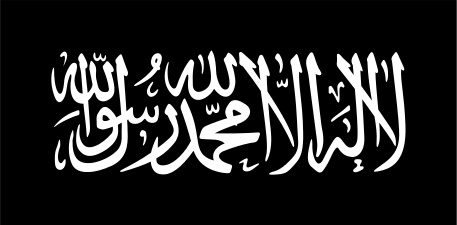Hadith of black flags
Hadith of black flags (Arabic: أحاديث الرايات السود) is a motif featured in Islamic apocalyptics, about people carrying black banners. Originally, probably identifying followers of the Abbasid Revolution,[1][2] modern jihadistic groups often identify themselves with the black banners.[3]

In Hadith
The Hadith attributed to Muhammad say:
"There will emerge from Khorasan black banners which nothing will repel until they are set up in Jerusalem"
— Ahmad in al-Musnad, 14/383 [4]
"When the black flags come from Khorasan go to them, even if you have to crawl on snow, for among them is the Khalifa from Allah, the Mahdi"
— Abd al-‘Alim in al-Mahdi al-Muntazar [5]
"Surely black flags will appear from the Khorasan until the people (under the leadership of this flag) will tie their horses with the olive trees between Bait-e-Lahya and Harasta (names of places in Jerusalem)"
— Nuaim Ibn Hammad in Kitab Al-Fitan [6]
"A Nation will come from the east with black flags and they will ask for some goodness (authority) but the people will not give them, then, they will fight and win over those people. Now the people will give them what they asked for but they will not accept it until they will hand it over to a person from my progeny who will fill this earth with justice just as it was previously filled with oppression and tyranny. So if anyone of you finds this nation (i.e. from the east with black flags) then you must join them even if you have to crawl over ice"
— Al-Barzanji in Isha’ah li Ashrat Al-Sa’a [7]
"Three will fight one another for your treasure, each one of them the son of a caliph, but none of them will gain it. Then the black banners will come from the east, and they will kill you in an unprecedented manner. When you see them, then pledge your allegiance to them even if you have to crawl over the snow, for that is the caliph from Allah, Mahdi"
— Sunan Ibn Majah, 4084 [8]
Interpretation
Early Islam
Greater Khorasan is a large territory that includes most of northern Afghanistan and north-eastern Iran. From a political point of view it also includes Transoxiana and Sistan. The region that is now known as Khorasan Province encompasses less than half of historical Khorasan; the rest of that region now belongs to Afghanistan. These black banners may be those with which Abu Muslim came and overthrew the Umayyad Caliphate in 132 AH.
Jihadism
Modern Jihadist organizations such as Al-Qaeda, Taliban and Islamic State also use black flags.[9][10]
Based on a hadith of questionable origin,[11] about recommending to join the army with black banners, acts as a rallying cry for many Jihadist groups, often accompanied by a myth [12]
References
- Donner, F. (1986). Black Banners from the East: The Establishment of the ’Abbāsid State–Incubation of a Revolt, by Moshe Sharon. (The Max Schloessinger Memorial Series, monograph 2.) The Magnes Press, Jerusalem; E. J. Brill, Leiden1983. Middle East Studies Association Bulletin, 20(1), 73-75. doi:10.1017/S0026318400059058
- TOURAJ DARYAEE APOCALYPSE NOW: ZOROASTRIAN REFLECTIONS ON THE EARLY ISLAMIC CENTURIES University of California, Los Angeles p. 193-194
- Justin O’Shea ISIS: The Role of Ideology and Eschatology in the Islamic State
- "The hadith narrated from Abu Hurayrah about the black banners". islamqa.info. Retrieved 2018-07-15.
- "The Black Flags From Khurasan". al-islam.org. Retrieved 2018-07-15.
- "The Black Banners Will Appear 6 Years Before Imam Mahdi". ghayb.com. Retrieved 2018-07-15.
- "The Black Banners Will Appear 6 Years Before Imam Mahdi". ghayb.com. Retrieved 2018-07-15.
- "The appearance of the Mahdi". Sunnah.com. Retrieved 2018-07-15.
- "The hadith narrated from Abu Hurayrah about the black banners". islamqa.info. Retrieved 2018-07-15.
- "Black Flags by Joby Warrick". penguinrandomhouse.com. Retrieved 2018-07-15.
- Justin O’Shea ISIS: The Role of Ideology and Eschatology in the Islamic State p. 61
- Justin O’Shea ISIS: The Role of Ideology and Eschatology in the Islamic State p. 61